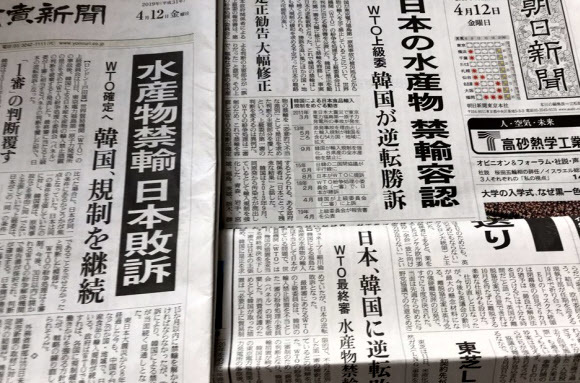Posted on : Apr.15,2019 17:34 KST
Modified on : Apr.15,2019 17:43 KST
 |
|
Japanese papers’ first-page coverage of the WTO judgment siding with South Korea on its bans of seafood imports from the Fukushima region. (Yonhap News)
|
The Japanese government is splitting hairs over a final WTO judgment on the South Korean government’s bans on seafood imports for the Fukushima area. In addition to insisting that Japan “did not lose,” it has been working to raise questions about the WTO itself. This is an unacceptable attitude from a member of the international community with an obligation to respect international agreements.
The Japanese government is the side that raised the issue before the WTO in the first place. In 2013, the South Korean government moved to ban imports of seafood from Fukushima and its surrounding area in the wake of the 2011 nuclear power plant disaster. It was a reasonable action from a government responsible for its people’s safety and health. Around 50 other countries besides South Korea also imposed import bans. Yet the Japanese government insisted on making the issue into a trade dispute – and its complaint was only against the South Korean government.
In this case, Japan should comply with the WTO’s final judgment. Yet in a press conference soon after the WTO’s decision siding with South Korea, Chief Cabinet Secretary Yoshihide Suga expressed “profound dismay that our position was not recognized.” Noting that the “first trial’s ruling that Japanese food is scientifically safe and sufficiently meets South Korean safety standards was upheld in the second trial,” he added that the “claim that Japan lost is not correct.” This was a grossly self-serving reading. Japanese Foreign Minister Taro Kono also stressed that there was “no change in [Tokyo’s] position demanding the abolition of South Korea’s import restrictions.” In a word, the Japanese side appears to be going off the rails.
The Japanese government and media also trotted out bizarre calls for “reforms” to the WTO. Kono declared that the WTO’s appeal institutions were “not doing their job,” pledging action by Japan toward the “WTO’s modernization.” In an editorial titled “What is the WTO for?” the far right-leaning Sankei Shimbun newspaper called the ruling “wild” and “incomprehensible,” opining that it “reaffirmed the need for reforms to the WTO.” Back when the WTO sided with Japan during the first hearing in February 2018, the Japanese government said it “welcome[d]” the decision and “hope[d] that South Korea will take the WTO’s decision seriously.” In short, they agree with it only insofar as it suits their tastes.
Japan expected to win, so the ruling must have come as a shock. It had anticipated that a victory would allow it to expand its exports to other countries besides South Korea; that plan has now fallen to the wayside. If anything, the case only raised deeper concerns about the safety of Japanese seafood.
Within Japan, the administration of Prime Minister Shinzo Abe is said to be coming under heavy criticism, with calls for it to take responsibility. Some analysts have suggested the administration’s attacks on the South Korean government, WTO, and other outside targets are intended for the domestic political audience’s consumption. According to this analysis, it’s an attempt to deflect calls for responsibility and rally supporters ahead of Apr. 21 by-elections in Osaka and Okinawa, which are seen as “skirmishes” in the lead-up to anticipated House of Councillors elections in July. This appears possibly connected to the message leaked by Japanese government officials to the Kyodo News agency and other media on Apr. 14 that Abe was “considering pushing back” a bilateral summit with South Korean President Moon Jae-in at the upcoming G20 Summit in Osaka in June.
This sort of attitude from Tokyo is terribly irresponsible. It stands to intensify anti-Japan sentiment in South Korea and do potentially irreparable damage to relations between the two sides. Rather than trying to shift the blame, the Japanese government should accept the WTO ruling and work at improving the safety of its seafood.
Please direct comments or questions to [english@hani.co.kr]






